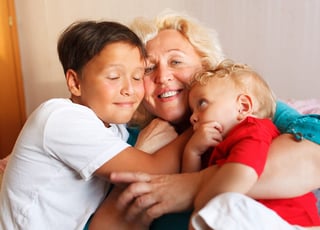 As adults, it is always so exciting when we meet new relatives and new people. As a child, this is not always the case. Already overwhelmed with different sounds and smells, children are confronted with strangers who look, talk, act, walk different from mom and dad. For some children this is interesting and exciting and they cannot wait to make new friends. For others, this is scary and uncomfortable. Joanne Faber, author of the book How to talk so Little Kids Will Listen, says “That level of discomfort and shyness can make a child seem rude, and leave you thinking, ‘I’m a bad parent,’”
As adults, it is always so exciting when we meet new relatives and new people. As a child, this is not always the case. Already overwhelmed with different sounds and smells, children are confronted with strangers who look, talk, act, walk different from mom and dad. For some children this is interesting and exciting and they cannot wait to make new friends. For others, this is scary and uncomfortable. Joanne Faber, author of the book How to talk so Little Kids Will Listen, says “That level of discomfort and shyness can make a child seem rude, and leave you thinking, ‘I’m a bad parent,’”
This situation is very common, but parents and children alike are struggling to find a solution. Many child psychologists agree that children should not be forced into social behaviors, such as giving or receiving hugs or kisses before they are ready, nor should they be ridiculed for making a social fopaux. Instead there are many simple steps to take with the child so that meeting new people, especially new adults, is not so daunting.
One way is to let the child have some control. A father in North Carolina offers as a compromise “If you want a hug or a kiss, you have to ask permission, and if he says no, you have to be OK with that.” In this way the child’s feelings are acknowledged and he does not feel that things are happening out of his control. Furthermore, when the child does offer the hug or kiss the parents and relatives can acknowledge and praise good social behaviors. This further carries the point of positive reinforcement for pleasant behaviors.
Also, there is a feeling of not being acknowledged that can goes both ways in a situation where the child does not feel ready to greet or interact with a new person. On the one hand, the child can be forced to do something he or she really does not want to do and this can put the child’s developing sense of identity and ability to assert themselves at risk. Yet, on the other hand, the new person in the room feels slighted, even if only a little. A political science professor in New York had this solution when her daughter would stand behind her legs if a new person were in the room. If the child is not ready to hug or talk to a new person, they can still acknowledge them through eye-contact. This simple but affective interaction helps build confidence in the child as he or she acclimates to new social settings.
Other helpful tips for children who have not yet come out of their shell are to consider the child’s sensitivity, i.e. to touch or loud noises, and also let them know ahead of time who they might see and what they can expect. Keep in mind, that the child might not always be on their best behavior and it can be hard to master many social skills at once. Patience and understanding is key.
https://www.wsj.com/articles/when-your-child-wont-hug-the-relatives-1514305135





